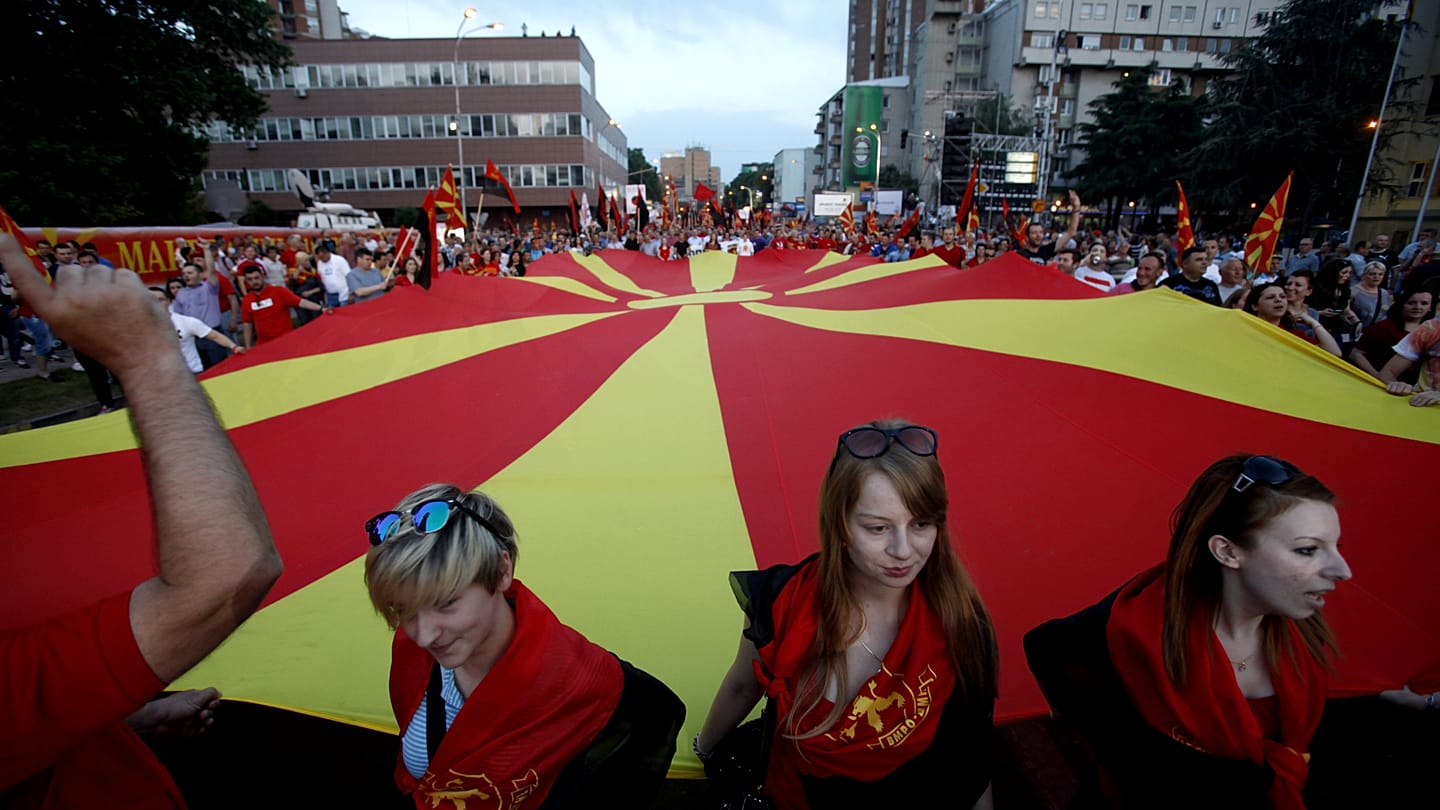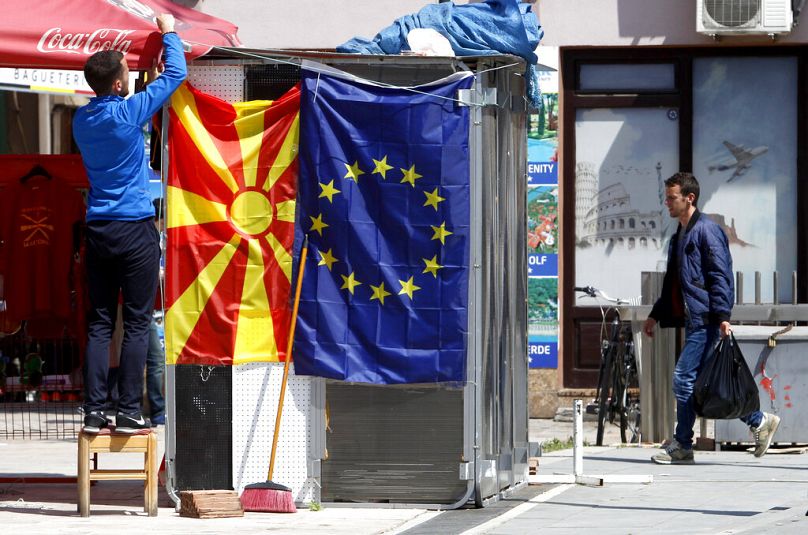
Historical, cultural and linguistic disputes keep the EU door closed to North Macedonia, while the key is held by “brotherly” Bulgaria, which has promised it will not back down until its neighbouring country fulfils the agreement reached in 2018.
The disputes between the two countries date back for years, as do attempts at reconciliation. And although politicians have repeatedly signed agreements promising good neighbourly relations and conflict resolution, this has still not happened. But whose fault is it?
While language, identity and history remain a hot topic, above all, the main obstacle for North Macedonia remains its refusal to comply with the so-called “French proposal” from 2022, according to which North Macedonia must include the “Bulgarian community” in its constitution as a basic condition for progress in the accession process.
Although the government of North Macedonia at the time voted in favour of this proposal, the country today refuses to implement it.
Prime Minister Hristijan Mickoski calls this decision by his predecessors a “political and strategic mistake” that has endangered the country’s European path and European future.
“The second round of the local elections in North Macedonia has not yet taken place, but once it is over, we can probably expect a more reasonable attitude on their part,” EPP MEP Andrey Kovatchev tells Euronews.

A few weeks ago, Mickoski called on the European Council to issue a conclusion confirming that there is no problem with the separate Macedonian identity, language, and “centuries-old culture.”
However, there is a problem for Bulgaria. Not only in terms of non-compliance with the decision already taken — to include Bulgarians in the constitution of North Macedonia — but also in terms of the language and history of the two countries.
Bulgaria insists that the Macedonian language is a dialect of Bulgarian, while North Macedonia argues that it is separate and unique.
The reasons for this dispute are actually much deeper — in the obviously painful shared history of the two so-called “brotherly peoples,” as Skopje questions Sofia’s historical heritage within its territory.
In this, the disputes on the subject often take on a tone that is not in keeping with good diplomacy.
Bulgaria claims that North Macedonia is imposing “anti-Bulgarian rhetoric,” while North Macedonia claims that Bulgaria is threatening its identity. And so, for decades, this political “ping-pong” has been played out at the gates of the European Union.
Attempts to find a solution
In 1999, the so-called “Declaration of Good Neighbourliness” was signed between Bulgaria and (then) the Republic of Macedonia, largely brought on by the conflict in neighbouring Kosovo and security threats to the broader region.
In a critical situation like this, the two countries united in the name of regional security. Bulgaria, which was about to join NATO at the time, pursued a policy of refusing to accept refugees.
However, given that the destabilisation in the Balkans was a serious risk, Bulgaria relented and helped set up refugee camps for those fleeing the wars in the former Yugoslavia, close enough to their homes so that they could return after the war ended.
The state helped the then-Republic of Macedonia, and this assistance was “appreciated,” according to those who participated in the talks.
However, the danger passed, as did the “good neighbourliness” between the two countries. The following years saw new and more fierce verbal political clashes.

In 2004, the then-Republic of Macedonia applied for EU membership and was given candidate status, which has since famously stalled. In the meantime, Bulgaria joined the EU in 2007. This complicated the situation for Skopje.
In addition to Bulgaria, Greece also held the key to the door and refused to open it due to its own issues with Skopje, including the country’s name, which Athens believed was only related to its northern region.
More than 10 years after submitting its membership application, the Western Balkan country and Greece found a way forward.
In 2018, the central matter — the dispute over the name — was resolved by the Prespa Agreement. Skopje accepted the name North Macedonia, and Athens lifted its veto. And it was only Sofia in the way.
While in 2017 the two signed a friendship treaty lauded by the EU, which, for the first time, mentioned “the Macedonian language, according to the constitution of the Republic of Macedonia,” neither side backed down from its positions.
A new attempt to resolve the impasse was made in 2021, when Bulgaria and North Macedonia signed a cooperation agreement that included the creation of a joint historical commission to resolve historical disputes. The results of this commission’s work remain unclear, according to analysts and politicians.
In 2022, France proposed that the veto on North Macedonia’s accession to the EU be lifted, but that the country accept the constitutional changes requested by Bulgaria, officially recognise the Bulgarian minority, guarantee its protection, and eliminate anti-Bulgarian rhetoric.
The French proposal was accepted and approved by the Macedonian government, and in 2023, nearly 20 years after the approval for negotiations, they began.
And once again, they have stopped because the government of Mickoski has questioned the legitimacy the constitutional changes and has announced that they will not happen without clear fulfilment of the obligations of the “eastern neighbour” and specific guarantees from the European Union.
Now, in turn, North Macedonia is demanding that Bulgaria recognise the Macedonian minority in western Bulgaria.
“We see that (Skopje) is trying to change the negotiating framework, but I do not expect this to be possible. They are not complying with the negotiating framework and the 2018 neighbourhood agreement, which is very sad,” commented MEP Kovatchev.
“Their desire to have no other demands from Bulgaria has been respected and voted on by the Bulgarian parliament. The only thing they must do is to include ‘the Bulgarian community’ in their constitution.”
“We want their membership, but they must fulfill their commitments,” Kovachev added.
What about the people?
Undoubtedly, tensions between the two countries exist at both the political and national levels.
Or at least that is what a series of political exchanges suggests, leading to physical violence, arson and other attacks on cultural centres in both countries.
In recent years, several Bulgarian cultural clubs in Skopje have been attacked, as has a Macedonian club in Bulgaria.
Protests marked by the political presence of supporters of the Macedonian VMRO-DPMNE party have also complicated the situation.
In 2023, a brutal physical attack on the secretary of the Bulgarian Cultural Club in Ohrid seriously endangered the fragile progress between the two countries.
Whether the acts of aggression are the result of brooding resentment between two brotherly nations or a politically motivated provocation aimed at destabilising the negotiations remains unclear.

However, if you travel around the towns and villages of Bulgaria and North Macedonia and ask people whether they resent the other, you are likely to get many more answers along the lines of “They are our brothers”.
Yet, Macedonians might have become further disillusioned about their EU future due to the obstacles on their path, according to authorities in Skopje.
“We are all for the EU, and we all want to be in the EU, but not at any cost,” Mickoski said in an interview for Macedonian TV channel Kanal 5 in July.
“These people, these citizens and this country have given so much like no other, and the citizens are fed up with this type of politics, now or never, the window is open, now is the momentum… We have been hearing this since (former EU foreign policy chief Javier) Solana,” Mickoski concluded.
Euronews’ flagship EU Enlargement Summit in Brussels on Tuesday will be broadcast live and on YouTube.